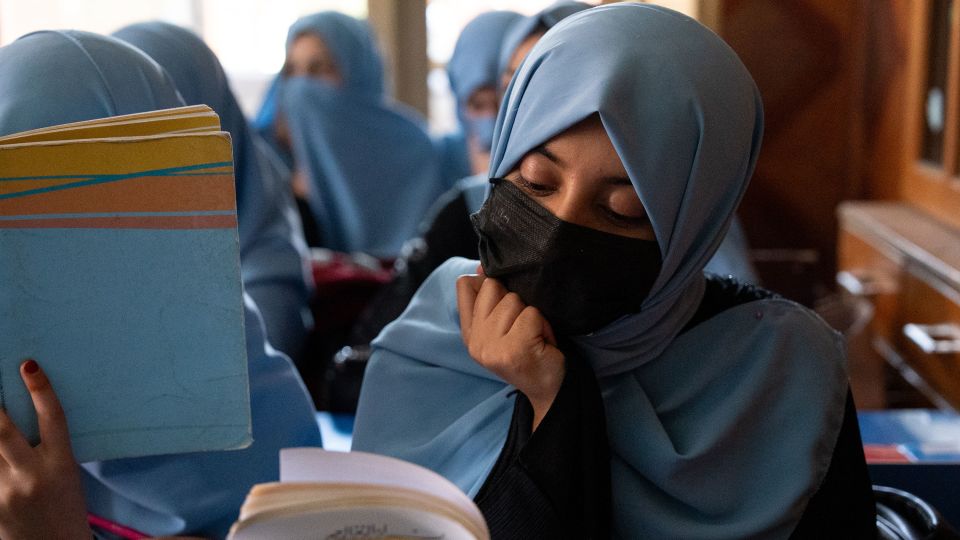
The Struggle for Education in Taliban-Ruled Afghanistan
In the heart of Kabul, a teenage girl at the Naji-e-Bashra madrasa, a girls-only religious school, speaks with hesitation. She recalls her aspirations of becoming a doctor but admits that the arrival of the Taliban has changed everything. “I wanted to be a doctor in the future,” she says, before pausing and correcting herself. “But when the Taliban came to Afghanistan, all the doors of schools were closed.” Her classmate, aware of the risks, grabs her arm beneath the table, signaling the need for caution.
Despite their flaws, these religious institutions are often the only educational option available for Afghan girls over 12 years old. Afghanistan is the only country in the world that completely bans girls and women from receiving general education at secondary and higher levels. This ban is part of a broader crackdown on women’s rights by the Taliban since they took power in August 2021. The government now dictates how women must dress, where they can go, and who they can associate with. For instance, women are required to have a male guardian when traveling.
In July this year, the International Criminal Court sought arrest warrants for two top Taliban leaders, citing the persecution of women and girls as evidence of crimes against humanity. However, the Taliban has denounced the court, claiming it shows “enmity and hatred for the pure religion of Islam.”
The Taliban initially claimed the suspension of female education would be temporary, suggesting that mainstream schools might reopen once security improved. However, after four years, the fundamentalist faction of the Taliban appears to have gained control. Non-religious schools, universities, and even healthcare training centers remain inaccessible to half the population. A March report by UNESCO revealed that nearly 1.5 million girls have been denied access to secondary education since 2021.
The Rise of Madrasas
While the number of madrasas educating both girls and boys across Afghanistan has increased sharply, many girls and women view these institutions as inadequate substitutes for the education they previously had access to. According to data from the Ministry of Education, 22,972 state-funded madrasas have been established over the past three years.
At the Naji-e-Bashra madrasa, where rare access was granted to film, enrollment has surged since the Taliban began restricting girls’ access to mainstream education. The curriculum is dictated by the Taliban, with religious content dominating. In private madrasas, some subjects like languages and science are also taught, but in public ones, the focus remains almost entirely on religious studies.
A report by the Afghanistan Human Rights Center found that the Taliban's revised curriculum fails to meet international human development goals and instead promotes violence and opposes values such as tolerance, peace, and human rights. Textbooks have been altered, and concepts like democracy and women’s rights are now prohibited.
The Principal’s Perspective
The principal of Naji-e-Bashra, Shafiullah Dilawar, claims that the curriculum is beneficial for preparing girls to become good mothers. He denies any suggestion that the schools serve the Taliban’s ideological goals, insisting that many families are satisfied with this form of education and urging the international community to support it.
However, not all Afghans share this view. Many believe that madrasas cannot replace the comprehensive education they once had. One such individual is Nargis, a 23-year-old woman in Kabul who studied economics at a private university before the Taliban’s takeover. She now runs a secret school for her younger sisters and other girls, teaching them mathematics, science, computing, and English.
Nargis’s makeshift classroom operates under constant risk. Every morning, around 45 students sneak into her home, sharing textbooks and supplies. Despite the danger, she continues her efforts, refusing to abandon her students even after being arrested and reprimanded by the Taliban.
The Impact of Lost Opportunities
USAID had previously funded secret schools and study abroad programs, but with the cancellation of aid contracts under the Trump administration, many of these initiatives are now ending. Nargis, who had benefited from an online program, recently lost her chance to continue her studies, which she sees as the end of her dreams.
She struggles with feelings of despair, questioning the purpose of her efforts. “For what job and what future?” she asks. Her mother, who never had an education, once told her about life under the previous Taliban regime, inspiring her to study hard. Now, she wonders if there is any difference between her and her mother.
In Taliban-ruled Afghanistan, women are restricted from working in most public spaces or mixing with men who are not family members. Nargis’s story reflects the broader struggle of countless Afghan women who are fighting to preserve their right to education in the face of extreme restrictions.